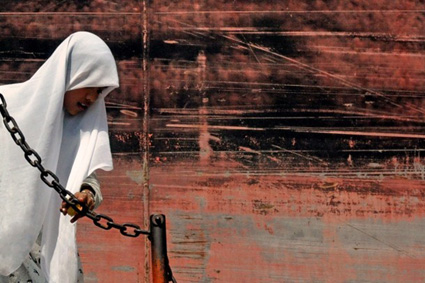Beyond expectations the final legislative candidates list included 37 percent women or about 74,000 from almost 200,000 across the nation. This was naturally because all the political parties chased after women to avoid being disqualified for not having at least 30 percent of female candidates for the House of Representatives, the provincial and regional legislative councils and the Regional Representative Council (DPD).
The figure alone was a source of a bit of cheer on this year’s International Women’s Day, though there is considerable whispering about the candidates’ qualifications.
A number of women’s groups, within and outside the Indonesian Women’s Coalition (KPI), are organizing a series of events until next month in conjunction with the international day. They aim to ensure that regardless of how many women actually make it to the legislative bodies, the resulting policies will benefit the grassroots, including women who make up over 49 percent of the population.
This is the right approach, as women have realized that despite the minimum percentage of female candidates much less will be elected and even less will likely push for policies that would “benefit the grassroots”. And to be able to ensure such policies the women’s movement needs to show it can network widely and influentially across the parties.
In a bid to get better policies than those deliberated over the last five years, the women activists said they would have to work much more intensively with lawmakers. Coalition of Indonesian Women for Justice and Democracy (KPIKD) secretary-general Dian Kartikasari acknowledged Friday that there were many more meaningful laws resulting from the House’s 2004 batch, compared to the 2009 one, which had the highest percentage of women lawmakers in Indonesian history — 18 percent of the 560 members.
As part of consolidating forces the women’s groups, together with student organizations, particularly the women, launched the Movement for Plural Indonesia on Friday — Gerakan Indonesia Beragam. While beragam means plural, they said it stood for an Indonesia that should be sovereign, clean from corruption, just, gender sensitive and diverse.
Among others trends of fundamentalism threatening the interests of women, said Misiyah of the Kapal Perempuan (Women’s Ship) Institute, the reproductive rights of women are even more ignored, she said. The high maternal mortality rate of 359 for every 100,000 live births is dragging the country back to almost a decade ago, she said.
While many factors are responsible for these women dying in labor or pregnancy, Misiyah said it was patriarchy that contributed heavily to decisions regarding women, mainly in poor households, in need, which resulted in late access to medical help.
Anis Hidayah, leader of Migrant Care, blamed “gender-blind” policies that failed to protect the millions of — mainly female — migrant workers; dozens are dying by the day, yet, the budget to protect them has decreased, she said.
How many of the newly elected lawmakers will understand issues like this? This is the concern of the women’s movement, which realizes that women politicians more or less share the blame for lack of influence on decision makers. The women and men who will win the legislative elections would mostly include incumbents. Of the current candidates, the KPI’s Dian said 18 percent of women were likely to get elected — those numbered 1 to 3 by their political parties on the ballots. About a quarter were assigned lower numbers, a sign that they were not considered serious contenders by their parties.
Political analyst Ani Soetjipto says as political parties virtually grabbed women to avoid disqualification, it’s better to reserve more hope of more quality women candidates for the 2019 elections. But within and outside the legislative bodies, it is urgent that women groups work as closely as possible with decision makers from whatever political faction. Not many activists look thrilled even though many of their own have been recruited by the political parties.
As making up almost half the population “women are the main targets of transactional politics,” said another activist. A founder of the Women-headed Household Association (Pekka), Nani Zulminarni, says thousands of its members had been asked to support almost 30 fellow members recruited into diverse parties.
But she expressed concern that these women, who lead a few dozen to a few thousand in their communities, had been driven into a lion’s den. “Never mind, they’ll come out tougher,” says Nani. Pekka aims to accompany these women regardless if they win or lose, she added.
The question is how the women’s movement will be able to accompany female and male lawmakers from the local to national level. Activists have acknowledged that the movement has not managed to become as solid as other powers that have emerged from decentralization.
The most painful evidence includes local sharia-inspired bylaws, which potentially discriminate women. Women activists widely protested one of the first such bylaws in the city of Tangerang in Banten; they lost the lawsuit and many other similar bylaws cropped up in other cities and regencies. Women’s voices were united against violence, as clearly shown in the passing of the law on domestic violence. But when policies touch on morality, these are the hardest test of women’s clout, as many women willingly and proudly rally for symbols of their community’s identity, such as the pious Muslim.
Ahead of the 2014 elections the women’s movement has little time to strengthen its unity, while power seekers seek their participation in a system where they must figure out and maneuver space to influence decisions. Some of their idealists, if elected, might rot as many incumbents fear. An attempt to remind incumbents and new politicians of their commitment to a more-just society includes the planned rallies and dialogues in the following weeks in 53 regencies and municipalities, just one part of bringing together the older and new generation of the women’s movement. Such efforts are small steps, but remain crucial. They must continue if women hope to move beyond mere figures of their representation.
Article by The Jakarta Post.
Link: http://www.thejakartapost.com/news/2014/03/10/women-s-day-beyond-37-percent.html








